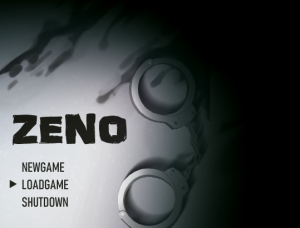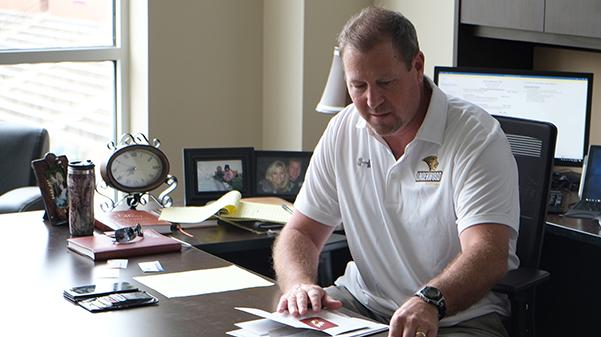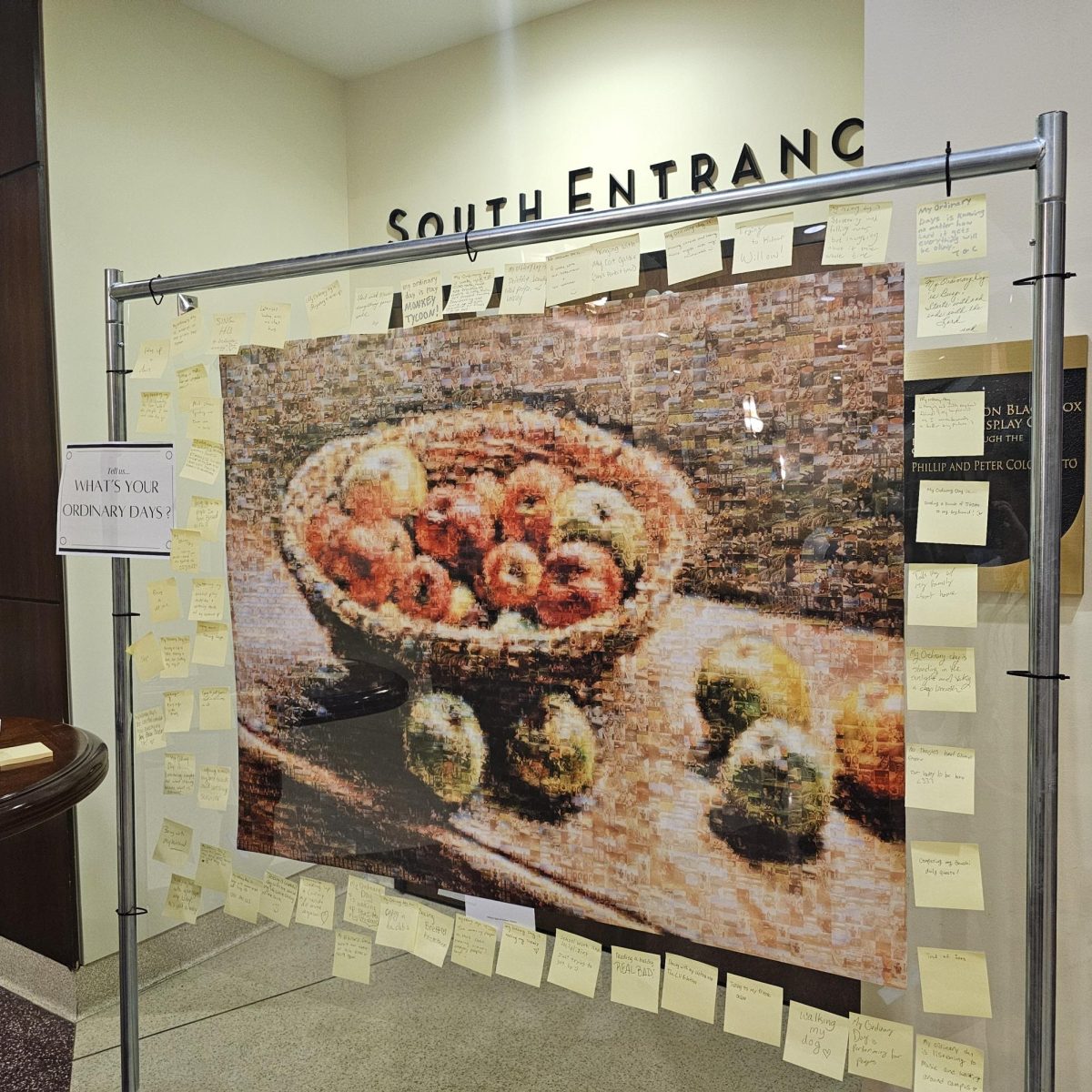Kelsey Hahn | Lindenlink staff

Photo by: Tom Hahn
Lindenwood’s 2013 Spring graduation came and went on Saturday, May 18. More than 1,000 people walked to the front of The Family Arena to receive their diplomas for four years of hard work and effort. I was among the several who walked that day.
Most people believe that having a diploma means that they instantly qualify for a job upon graduation, but this is not true. A diploma is only a piece of paper, and gaining employment goes far beyond giving a university four years of your time.
I have heard from more than one person that it is difficult finding employment in today’s economy. They are right, it is difficult, but it is far from impossible. I am living proof of this.
Between the months of March through April, I interviewed with five companies, and was given offers from three of these. Two of these offers, I was able to negotiate a very reasonable salary with. Finally, I accepted one of these offers, and started my job this month. I must say, I love my job so far! Many friends and acquaintances were shocked at how quickly I was able to land interviews and a job, and all before graduation. Like I said, it was hard, but not impossible.
For those who recently graduated, or will be gradating soon, and are discovering the anxiety of unemployment, or job searching, I have compiled everything that I really believe was my key to landing an amazing job.
Resume and Portfolio
Before even beginning to job search, compile an outstanding resume and portfolio. A basic Microsoft Word resume is not enough. Your resume has to, and I repeat, absolutely has to stick out. That doesn’t mean print it on zebra striped paper, or with huge font sizes and some crazy layout. Depending on your field, design a modest yet original resume that looks neat and professional.
Remember, whoever reads your resume is judging you in every way. Have several people look at your resume; professors, professionals, family, and friends. I had three professors check out mine, and all of them had excellent suggestions. Also use your resume to tell the employer something about yourself. If you want to show the company you are organized, use excellent organization when creating your resume. Just keep reminding yourself, that your resume is your first representation of yourself.
Coming up with a portfolio is the second part of a resume, and just as important as a resume. While a resume is important, if you want that dream job, you need a portfolio. Portfolios can be a simple folder with a few documents, to an elegant leather portfolio full of professionally printed images and documents. Depending on your field is how you should choose the way you present your portfolio. For someone in business or finance–even web development, a folder is most likely fine. A graphic designer, artist, or photographer should lean towards a more elegant portfolio.
Just remember, what are you trying to tell the company about yourself? Here are some great things you can include in your portfolio. Remember, use a better paper choice than just printer paper for all documents.
- Letters of Recommendation(I included two of these in mine)
- Dean’s List or Honors Awards
- Cover Letter(I included this in mine)
- Printouts of projects
- Project lists
- Business and Project Plans or Data
- At least three professional references(I included this in mine)
- Writing Samples

Photo by: Kelsey Hahn
For writers, web-designers, programmers, artists, and graphic designers, along with several other fields, it is highly recommended that a digital portfolio is created. A digital portfolio is a great trend right now. Web-Designers, absolutely should have their own domain to spotlight their web talents. A writer could lean towards a free bog such as Tumbler or WordPress for writing samples. I am sure it is helpful for any career to have a digital portfolio, but as a web developer, I can not stress enough how important it is to have your own domain and website.
Social Media and Your Image
This is very important advice and not everyone’s favorite. Clean up your on online image. That means get rid of anything on Facebook, Twitter, Google+, that you don’t want an employer to see. Remember, what is on your social media is a reflection of yourself. I promise employers will Google you and stalk you if they decide to interview you. Three out of my Five interviews made a point to discuss things that they had found out about me by goggling me. I was really thankful that I had made a point to delete Facebook photos from two or three years ago that I would not want an employer to see.
On the same note, use social media to your advantage. On your status, talk about how much you love your field. I made a comment about a JavaScript problem I was doing for school on my Twitter page a few days before an interview I went on. One of the guys in the interview specifically asked me about the problem that he saw on my page. Make your profile picture something that you are proud of. Your social media sites are very personal, and this is a great way to really tell employers who you are. Use them to your advantage and not disadvantage.
Once you’re set up, it is time to begin the job hunt and interview process. Make sure that your voice mail is mature. Remember that if you don’t answer your phone, whoever is calling to set up the interview is going to hear your voice mail, be clear and professional. Again, I can’t say it enough; a company will judge you by anything and everything–so be on your best behavior. Make sure your email account is professional. It is best to use something simple with your name, and if you have your own domain, use your domain as your e-mail address. Do not use anything immature, vulgar, or goofy. Keep it simple!
Be communicative and responsive to the best of your ability. Employers know you may work or go to school, but be prompt. Return their phone-calls and e-mails as soon as you can. Also be professional in speech and in writing. Be sure to triple spell check everything, including simple responsive e-mails. Everything counts! Like your parents always said, use “Yes ma’am, No sir, No Thank you, Yes Please.” If you don’t sound happy and grateful to employers, they may not think you are serious about the position and this may go into the hiring decision.
The Interview

Photo by: Tom Hahn
If you make it as far as an interview, you have done things right so far. They like you! The interview process is the hardest, and most important part. Interviewing is nerve-wrecking, exhausting, and stressful . You will be cross-examined, interrogated, and tested. I am not sugar coating it, because this is truly how it is. My first interview I went on for a small design firm in St. Louis, in which I did not receive an offer I felt completely interrogated, terrified, and awkward. I had no idea what to do or say. After this interview I did a lot of research and really got my interview skills perfected. My best advice upon going to an interview is to carry four things; confidence, honesty, enthusiasm, and professionalism. I believe that honesty is the most important. I read somewhere that in an interview, honesty is the best policy because if you are honest and they don’t like you, than you probably would not be happy there anyway.
The job I accepted, I was extremely straight-forward. I told them with confidence what I was good at, and if I didn’t know something, I told them I didn’t. I also made a point to tell them I was a quick learner though, and would be more than excited to learn new skills. The truth to the matter, is in an entry level position, most companies would rather hire someone they like and think is easy trainable, than someone they can’t stand who knows everything. Also, being honest shows a company that you are an honest person, even if it puts you on the line. And if they don’t like you because of your honestly, than it isn’t meant to be; trust me.

Photo by: Kelsey Hahn
When you go to an interview, you have to be professional and perfect in your manner and appearance. Dress nice! Even if it’s not a super dressy place to work, dressing nice shows the company that you really went out of your way to impress them, showing that you are serious and really want the job. Do not chew gum! It will throw of your speech, but if you have a long interview take mints and quickly chew them between interviews. Don’t eat onions, fast food, or anything that will make your clothes or breath smell bad. Sounds a bit weird, but as I said before, companies are going to judge you in every aspect, so be prepared! Shake everyone’s hand, even if they don’t shake yours, always say hello and nice to meet you with a giant genuine smile and look them straight in the eyes. This you must do. When speaking use excellent eye contact and hand gestures. Don’t act awkward. The best thing to do is act natural and not stiff, nervous, or reserved. Don’t let the interviewers scare you. Be confident, they will notice!
And my final interview advice; remember that you are interviewing them as well. Jobs are a two way street. Prepare several questions the night before, and either type them up, write them down, or memorize them. This will truly impress the company. Don’t accept or settle for less than what you’re worth, and don’t let an interview intimidate you. While you are trying to impress them and be their perfect candidate, it has to go both ways. If the company doesn’t impress you, or you have a bad feeling about the company, than the position just may not be right for you.
Finally, don’t forget that after the interview it isn’t over! Be sure to send a thank you note to everyone in the interview if at all possible. Don’t just use the thank you note as a thank you, use it as your final weapon in mastering your position. Obviously thank the person for their time. Then one trick is to bring something up that was discussed at the interview. For example, if the interview talked a lot about how important customer service was in the position, be sure to remind the interviewer in the thank you, how excellent your customer service skills are. Bringing something up from the interview shows that you were attentive and cared about what the person had to say. Remind them how much you want to work for them, and how excited you would be to accept the position. Enthusiasm is the key.
Your big decision!

Graphic by: Kelsey Hahn
For me, selecting my offer was the hardest and most terrifying part of everything. While interviewing is terrifying, you either score a job or your don’t. If you have the luxury I had, and are offered more than one position, this is where the true hard part lies. I had three offers from three great companies, all with similar offers and similar benefits. One company was located in Chesterfield, one in Jefferson City, and one in Columbia. This was an extremely difficult decision to make. Since I had the luxury of being picky, I was able to negotiate a higher salary. I would not say you have to negotiate, but it is a recommendation. Know what you want to make, know what you can afford to make, and know what you believe you are worth. Also do your research. Look at average salary for similar jobs, with similar experience in that area. My first job offer I requested $8,000 a year more, I was astonished when they agreed. Since this was my first job offer and a pretty good offer, this gave me room to negotiate with the other companies. The second offer was a pretty low offer. When I was given the offer, I explained that I had another much higher offer on the table. I also let them know that I really wanted the position and would be willing to negotiate. They were able to raise the salary almost $5,000 a year. The third company I told the same thing to, unfortunately their offer was firm.
With three offers on the table, all reasonably similar, I had to sit down and figure out the choice I wanted to make. This decision to me was not just a decision of where I want to work, and what I want to do. I had to consider who my boss would be, the people I would work with, benefits, time off, would they help further my education, location, the cost of living, the community. Most importantly though, I had to consider my gut feeling. In the back of my mind, after scrutinizing the companies over and over again, I knew where I wanted to be, and I knew what felt right, I ended up going with a slightly lower salary, but I chose the job that I felt was best for me.
I look back at the interview process, the negotiating, and my ultimate decision, and I believe that I certainly with no doubt made the right choice. I put a lot of though into all of the choices and decisions I made, and at the end of the day, I feel proud and happy of my new job. Everyone will make their own choices and decisions on how they want to go about finding their career and what they want, but this is exactly what I did and I know that my decisions were good ones.



















